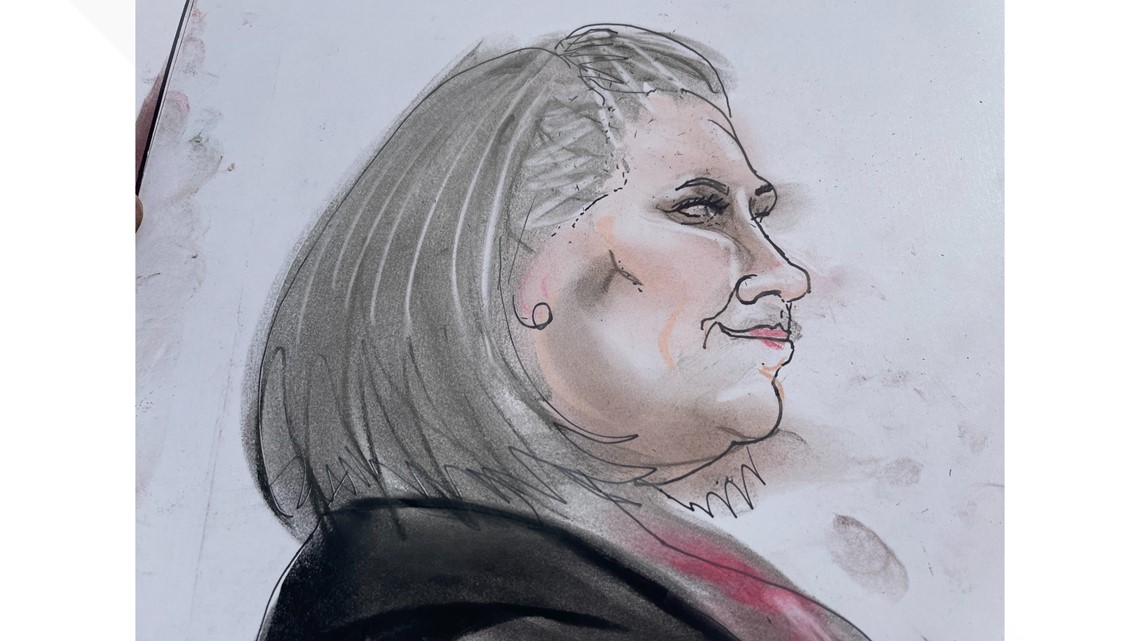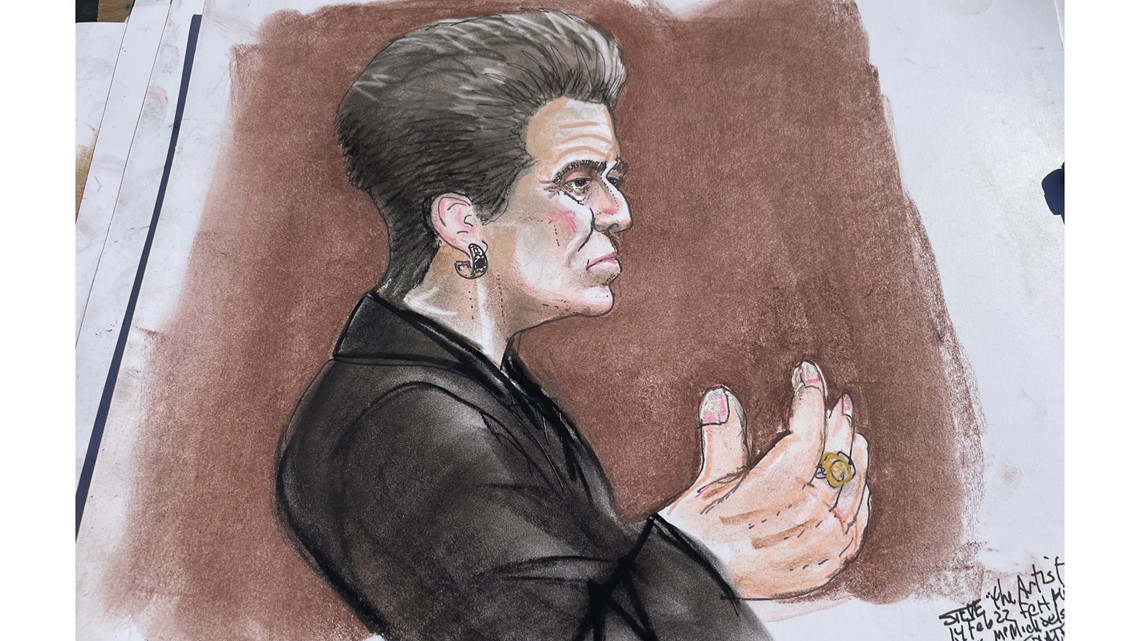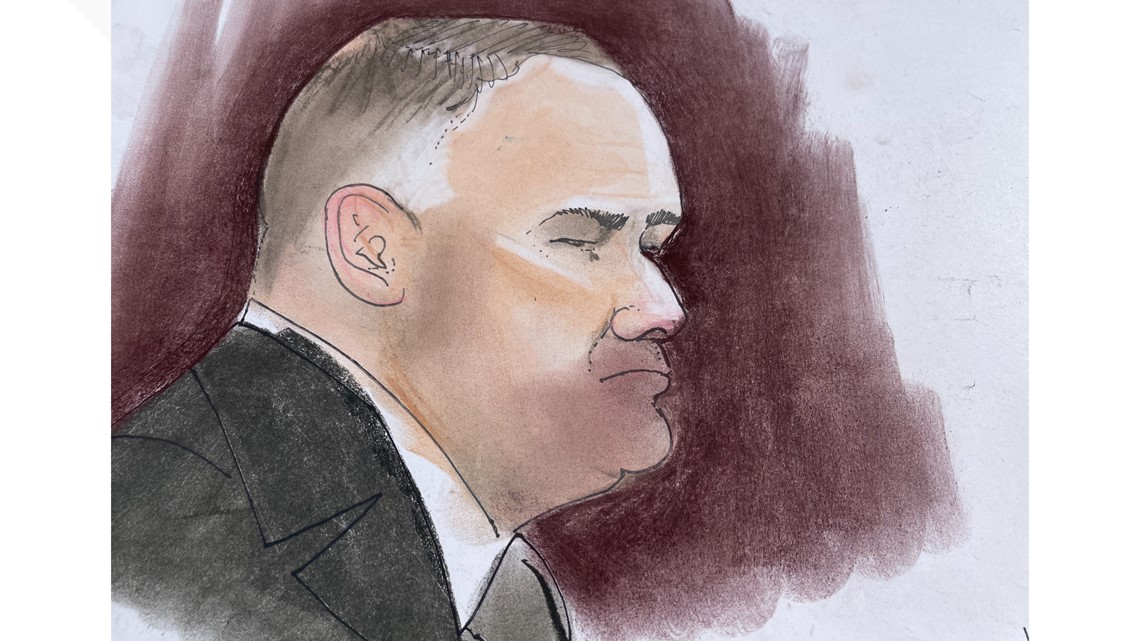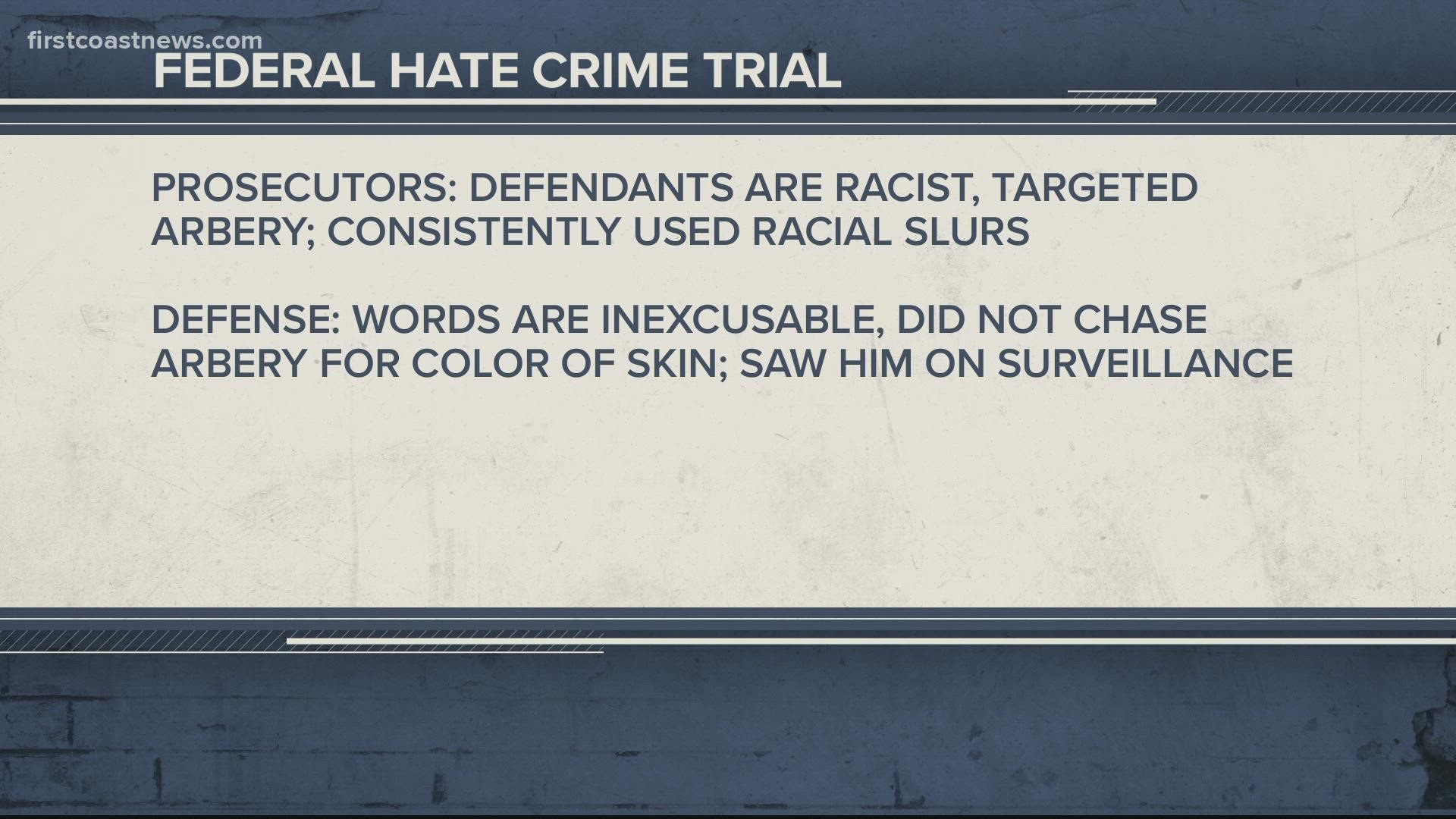BRUNSWICK, Ga. — Monday, attorneys on both sides gave opening statements in the federal hate crimes trial for the three men convicted of murdering Ahmaud Arbery.
It came after the jury was seated following a week of jury selection. The jury includes three Black jurors, eight white jurors and one Hispanic juror. All four alternates are white.
There was just one Black juror on the panel at the state trial.
No cameras are allowed in the federal courthouse, but you can follow along below for live updates.
Arbery's father, Marcus Arbery Sr., said he's very pleased with the makeup of the jury. Both of Arbery's parents said regardless of the makeup, though, they think they'll win the case.
In opening statements, prosecutor Barbara (Bobbi) Bernstein detailed what she said was a consistent use of racial slurs, including the n word, by the defendants over several years documented in texts and social media posts. She said Travis McMichael had referred to Black people as animals, criminals, monkeys and sub-human savages, among other names.
Bernstein also said Travis McMichael at one point told his friend he didn't work with any Black people and that's why he loved what he did. She said the defendants targeted Arbery solely based on the color of his skin.
Based on his skin color, the defendants thought he had to be in Satilla Shores to commit crimes, Bernstein said. She mentioned how a white couple had entered the home under construction that Arbery was seen in and neighbors weren't concerned about them, but were concerned about Arbery.
Gregory McMichael, she said, told a friend at one point, "those Blacks are nothing but trouble."
Bernstein said William Roddie Bryan learned his daughter was dating a Black man four days before the shooting. Bryan told a friend that his daughter had herself an 'n word.'
Arbery's aunt and father left the courtroom for a period of time, visibly upset, as the comments were made. Bernstein said in addition to talking about how the defendants talked about race behind closed doors, the prosecution will also discuss the history of Arbery's runs in Satilla Shores.
Bernstein said the racial slurs themselves aren't crimes, but they provide evidence about the defendants' mindsets and motivation.


Bernstein concluded by saying, “If Ahmaud Arbery had been white, he would’ve went on a run, checked out a cool home under construction, and been home in time for Sunday dinner. Instead, he was running for his life for no reason other than the color of his skin," she said.
Defense attorneys told the jury the words their clients used were inexcusable. Gregory McMichael's attorney, A.J. Balbo, said some of the things his client said are the "types of things that would make people cringe ... are offensive and sad." Balbo also called the killing of Arbery is an "American tragedy ... was unnecessary and horrific." He said, however, this is not a murder trial.
Balbo said, however, Gregory McMichael didn't chase Arbery that day because Arbery "was a Black man. It was because the man" he recognized from his neighbor's surveillance video inside the home under construction and suspected him of committing a crime.
Balbo said Gregory McMichael released the video of the shooting because he didn't think he had done anything wrong.
Travis McMichael's attorney, Amy Lee Copeland, told the jury that the video is hard to watch and is emotional. She said the racial slurs Travis McMichael used are wrong, and she doesn't use them.
She maintained that Arbery wasn't someone just looking around at a construction site once. Copeland said Arbery kept coming back and that is "just a little weird."
Copeland discussed how there were reports of crimes leading up to the shooting in Satilla Shores. She said Travis and Gregory McMichael just wanted to keep their neighbors safe no matter hat happened.


Bryan's attorney, J. Pete Theodocion, started off his opening statements by saying he wasn't there to "defend or excuse racism."
"I've heard the n word more today than I have in the last three to four years," he said.
Theodocion went on to say that although racial slurs are "ignorant and sad," Bryan is not obsessed with race. "He's not perfect ... he's embarrassed and sorry for the comments he has made." Theodocion said that race doesn't affect Bryan's actions, though.
He said Bryan saw a chase the day of the shooting and assumed something was wrong and that a crime had been committed. He said Bryan assumed there had to be a reason that Arbery was being chased.
Theodocion said Bryan didn't grab his guns before following Arbery, showing that he didn't want to harm him. He instead, his attorney said, was following Arbery to take a picture and/or video of Arbery to identify him to police. Theodocion continued that Bryan didn't know the McMichaels had guns, or what they were going to do.
Arbery's parents said it's going to be incredibly difficult to sit through this trial and hear the racial slurs the defendants used each day. However, they said, they're strong.


“I think that we will get another victory out of this," Wanda Cooper Jones, Arbery's mother, said. "I think it’s going to be a long, long, hard trial. A whole lot of hard evidence is going to come into play, so I have to be prepared for that each and every day, but I’m grateful that we’re here, that we’ve made it this far and I think that we’ll get a good victory as well."
"Hate, it's trickling in the bloodline," Arbery Sr. said. "The hate, when you see this color enough to get you killed, it's a sickness, and I tell you, this world can live without them, all three of them."
Barbara Arnwine, founder of the Transformative Justice Coalition and an attorney with Arbery's family, said they're preparing themselves for what they'll hear each day in court.
"This was painful," she said. "It was like somebody stabbing you repeatedly in the chest just over and over and over again, to hear those statements and to realize how senseless they were," she said.
Before lunch Monday, Copeland filed a motion asking to have all counts dismissed. She said counts one, two, four and five weren't certified correctly. Copeland used the basis of prejudice for count three. The judge denied the request.
Prosecutors will call their first witness at 9 a.m. Tuesday.
As this second trial of three defendants already convicted of murdering Ahmaud Arbery gets underway, there are many questions swirling about the reasons for the seemingly duplicative proceeding.
- What’s the difference?
Unlike their murder trial in state court, the new trial is a federal hate crimes case. Georgia did not have a hate crimes statute when Ahmaud Arbery was killed – it was just one of four states without one.
The state subsequently adopted a hate crime law, but the men could not be prosecuted retroactively under that law in state court.
- What’s a hate crime?
Despite the name, it is not necessary for prosecutors to prove the three men actually “hated” Ahmaud Arbery; only that they committed the alleged crimes because of his race.
RECAP:
5 p.m.: Throughout the day, prosecutors detailed what they say was a consistent use of racial slurs, including the n-word by the defendants.
They say Travis McMichael, the one who pulled the trigger, had referred to Black people as monkeys and savages, among other names.
Arbery’s family walked out of the courtroom, visibly upset, as the comments were made.
Arbery’s parents say it’s going to be incredibly difficult to sit through this trial, but they say they’re strong.

